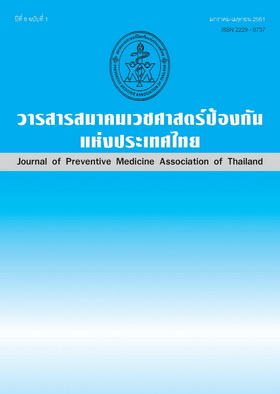Health Literacy among Diabetic Patients at the Family Practice Center of Phra Nakhon Si Ayutthaya Hospital
Abstract
Diabetes mellitus is one of the important noncommunicable diseases (NCDs) that requires good control of diabetes to prevent complications that affect not only quality of life of diabetic patients but also the national economy. Patients with good health literacy tend to have better communication with physicians and be able to modify their behavior to achieve diabetes treatment goals. The aim of this study was to find out the health literacy level and factors associated with health literacy among diabetic patients at the family practice center, a primary care unit of Phra Nakhon Si Ayutthaya Hospital, in Phra Nakhon Si Ayutthaya Province.
This study design was a cross-sectional study. The data collection was performed in 133 patients with type 2 diabetes mellitus at the family practice center during November December 2017. The randomization was done by selecting only patients with even number queue cards. The research tool was derived from the health literacy questionnaire for patients with diabetes and hypertension, developed by the Health Service Support Department, Ministry of Public Health and Mahidol University. The data were analyzed by using descriptive statistics and inferential statistics (Chi-square test or Fisher’s exact test).
The study result showed that 19.5 percent of diabetic patients at the family practice center had high health literacy level, while 80.5 percent had low health literacy level. The statistically significant factors related to health literacy level in diabetic patients were age, gender, education level, occupation, monthly income, smoking habits, and hypertension (p-value<0.05). Only 21.1 percent of diabetic patients had good health
behavior and there was a statistical relationship between health literacy level and health behavior (p-value<0.001). It is necessary to promote health literacy programs for diabetic patients in NCDs services in the future.
References
2. Nutbeam D. Health literacy as a public health goal: a challenge for contemporary health education and communication strategies into the 21 st century. Health promotion international 2000;15(3):259-67.
3. ขวัญเมือง แก้วดําเกิง, นฤมล ตรีเพชรศรีอุทัย. ความฉลาดทางสุขภาพ. นนทบุรี: กองสุขศึกษา กรมสนับสนุนบริการสุขภาพ; 2554.
4. วิชัย เอกพลากร. รายงานการสํารวจสุขภาพประชาชนไทยโดยการตรวจร่างกาย ครั้งที่ 5 พ.ศ. 2557. นนทบุรี: สถาบันวิจัยระบบสาธารณสุข; 2557.
5. ราชวิทยาลัยอายุรแพทย์แห่งประเทศไทยในพระบรมราชูปถัมภ์. แนวทางเวชปฏิบัติสําหรับโรคเบาหวาน 2560. กรุงเทพฯ: ราชวิทยาลัยอายุรแพทย์แห่งประเทศไทยในพระบรมราชูปถัมภ์; 2560.
6. ชะนวนทอง ธนสุกาญจน์, นรีมาลย์ นีละไพจิตร. การพัฒนาเครื่องมือวัดความรู้แจ้งแตกฉานด้านสุขภาพ (Health literacy) สําหรับผู้ป่วยโรคเบาหวานและโรคความดันโลหิตสูง. นนทบุรี: กองสุขศึกษา กรมสนับสนุนบริการสุขภาพ กระทรวงสาธารณสุข; 2558.
7. ชะนวนทอง ธนสุกาญจน์, นรีมาลย์ นีละไพจิตร. การสํารวจความรู้แจ้งแตกฉานด้านสุขภาพ (Health literacy) ผู้ป่วยโรคเบาหวานและโรคความดันโลหิตสูง. นนทบุรี: กองสุขศึกษา กรมสนับสนุนบริการสุขภาพ กระทรวงสาธารณสุข; 2559.
8. Kickbusch IS. Health literacy: addressing the health and education divide. Health promotion international 2001;16(3):289-97.
9. Nielsen-Bohlman L, Panzer AM, Kindig DA, editors. Health literacy : a prescription to end confusion. Washington, D.C.: Institute of Medicine; 2004.
10. Martin LT, Ruder T, Escarce JJ, Ghosh-Dastidar B, Sherman D, Elliott M, et al. Developing predictive models of health literacy. Journal of general internal medicine. 2009;24(11): 1211-6.
11. นงลักษณ์ แก้วทอง, ลักขณา เติมศิริกุลชัย, ประสิทธิ์ ลีระพันธ์, ธราดล เก่งการพานิช, ขวัญเมือง แก้วดําเกิง. ความแตกฉานด้านสุขภาพในกลุ่มเสี่ยงโรคความดันโลหิตสูง โรงพยาบาลส่งเสริมสุขภาพ ตําบลบ้านหนองหอย จังหวัดสระแก้ว. วารสารวิทยาลัยพยาบาลบรมราชชนนี กรุงเทพ. 2557;30(1):45-56.
12. เบญจมาศ สุรมิตรไมตรี. รายงานการศึกษาส่วนบุคคล เรื่อง การศึกษาความฉลาดทางสุขภาพ (Health Literacy) และสถานการณ์การดําเนินงานสร้างเสริมความฉลาดทางสุขภาพของคนไทยเพื่อรองรับการเข้าสู่ประชาคมอาเซียน. กรุงเทพฯ: สถาบันการต่างประเทศเทวะวงศ์วโรปการ กระทรวงการต่างประเทศ; 2556.
13. Schillinger D, Grumbach K, Piette J, Wang F, Osmond D, Daher C, et al. Association of health literacy with diabetes outcomes. JAMA 2002;288(4):475-82.
14. Berkman ND, Sheridan SL, Donahue KE, Halpern DJ, Crotty K. Low health literacy and health outcomes: an updated systematic review. Annals of internal medicine 2011;155(2): 97-107.
Downloads
Published
How to Cite
Issue
Section
License
บทความที่ลงพิมพ์ในวารสารเวชศาสตร์ป้องกันแห่งประเทศไทย ถือเป็นผลงานวิชาการ งานวิจัย วิเคราะห์ วิจารณ์ เป็นความเห็นส่วนตัวของผู้นิพนธ์ กองบรรณาธิการไม่จำเป็นต้องเห็นด้วยเสมอไปและผู้นิพนธ์จะต้องรับผิดชอบต่อบทความของตนเอง






